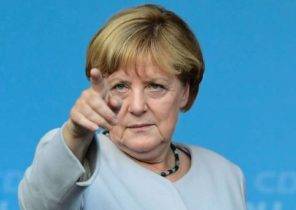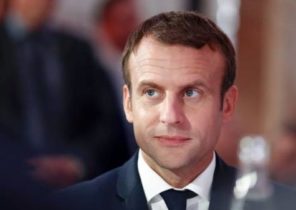
Iran for Russia and its people, still largely appears to be a “black box” with uncertain outlines. “Of course, this situation gives rise to their concerns, which have causes. First of all, they are based on the fact that our cooperation (with Iran and Russia — approx. TRANS.) in recent years was focused on Syria and its issues. The theme of the day was always Syria, and the essence of this is understandable. Cooperation between Iran and Russia was formed as a partnership is not “for something” and “against something”. The specificity of the political and military situation in Syria is that on the foreground the challenges and threats. Challenges and threats confront, so we had to work together to confront them.” On this issue the Institute for the study of Iran and Eurasia (IRAS) interviewed Grigory Lukyanov, a teacher of the Higher school of Economics and an expert of the Russian international Affairs Council (RIAC).
IRAS: What are the qualitative changes brought Donald trump in US policy compared to the previous administration?
Gregory L. As is often the case with the advent of the new administration, Washington’s policy is undergoing a phase tapped when a new team just “worked” and is determined so as to correlate what she wants because she can.
In the case of Donald trump we don’t see exceptions. His team lapped very hard, to the point that we are now quite difficult to understand how the process of adoption and approval of even the most important decisions.
After six months from the date of the inauguration of the trump the impression that in the current circumstances, his General line of foreign policy in the middle East is the desire to fulfill key campaign promises — to deploy all the forces of American military and diplomatic machines in the middle East to fight with the “Islamic state” (banned in Russia — Prim ed.), equally dangerous for Europe and Asia, and America and its closest allies (UK, Australia, Canada and New Zealand).
This requires some adjustment of US policy, but it is not a waiver of its General line aimed at the reduction of responsibility and presence of the United States in the region, while maintaining certain controls over the situation with minimal resources. Movement in this direction was begun under Barack Obama.
Certain steps in the process of realization of these ambitions was the restoration of relations with traditional partners in the region. First and foremost is Saudi Arabia and Israel. Before the vote on the referendum in Turkey was to be expected also for the rapprochement with Ankara. It would talk about restoring the triad allies, which the United States can rely on and delegate the solution of the regional problems. Turkey is one of the pillars of this triad.
Nevertheless, the development trajectory of the regime of Recep Tayyip Erdogan, as well as the inability of the trump in the current environment to go for those requirements imposed by Ankara, does not allow today, Turkey and the United States to converge.
So today, we are seeing improvement in Washington’s relations with Israel and Saudi Arabia, which is primarily aimed at creating new security architecture in the middle East given the U.S. desire to reduce its “costs” in this region. The aim was to create such a design of the device region that will best meet the interests of primarily the US, secondarily the countries of the region, who cooperate with America, and then the neighboring centers such as the European Union.
Against this background, unprecedented States has reduced its involvement in resolving other local conflicts. Against this background, Syrian track might seem the exception. Does the United States have been active and we understand that a campaign goal of defeating ISIL dominates strategic considerations. If in other areas the US is willing to delegate authority, Saudi Arabia and erected under its auspices and the real or half-dead integration organizations, in Syria, you have to decide for yourself. And support US here are not the Arab political forces, and Kurdish. This direction brings a certain turbulence in a seemingly coordinated system, and forces the Americans to get involved in an open confrontation.
Today we see that the battle with ISIS was delayed and blitzkrieg does not work. Not managed to take Mosul, quickly hurriedly. Same with Raqqa. However, while trump can’t prove that he won a resounding victory over ISIS, this condition will persist.
So, while trump will not win the LIH, it will not go away. And in this case can be called a victory? Is the complete destruction of ISIS?
— Victory over ISIS needs to be loud, visible, with the maximum presentation of the US role in achieving it. It must be a military victory, because she decides to trump a number of internal problems.
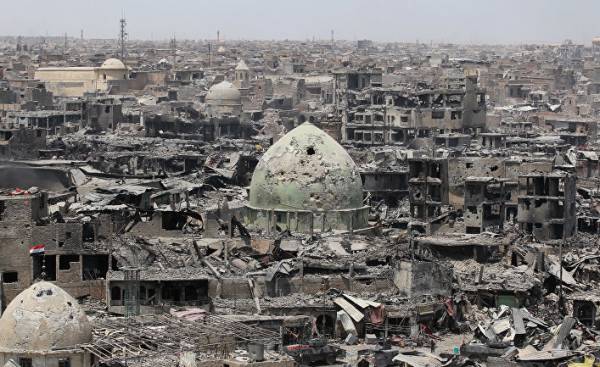 © AFP 2017, Ahmad Al-Rubaye panorama of the Old town in Mosul, Iraq. 9 Jul 2017
© AFP 2017, Ahmad Al-Rubaye panorama of the Old town in Mosul, Iraq. 9 Jul 2017
One of the groups who voted for trump, were military. Not generals, but soldiers who wanted the end of the war. But they should return victorious. The victory, which is needed to Trump, would be to capture the enemy’s largest cities and preventing the retention of a military monitoring Islamic state over Iraq and Syria. If ISIS will be driven underground, as was done with the Taliban in 2002-2003, it will suit trump.
That is, if only taken Mosul and raqqa remains from the “Islamic state”, this victory can not be called?
— This is not a victory, because ISIS would retain the fact that it is distinguished from “al-Qaeda” (banned in Russia — Prim ed.) — a territory, a springboard, it is the land of the Caliphate, which they won and which draws supporters from all over the world. Once they lose this land, their slogans will lose the Foundation and the organization will cease to be “special”. In this case, we can expect ISIS supporters around the world will simply dissolve in many tenacious structures “al-Qaeda” and other organizations, with varying degree of legitimacy on the ground.
What role is Iran in the new US policy in the middle East?
— This is a complex issue. Can only speak about what role he plays in the short and medium term.
In the current environment, when trump is betting on Israel and Saudi Arabia, thanks to their resources, opportunities and abilities to influence the situation in the region, it is also captive to the interests of its allies. Neither Israel nor Saudi Arabia can’t and don’t want to create a new security architecture with the preservation of Iran in the form in which it exists today. We are talking about Iran with its current political system and its ideological content. Both Israel and Saudi Arabia do not see its regional policies without countering the Iranian threat. So that the interests of the trump have been met, he is forced to radically change US policy towards Iran.
But that does not deny the fact that today, the United States could potentially at any time to abandon this approach and anti-Iranian rhetoric.
In the current environment we are seeing the US at some stage have supported anti-Iranian policy and rhetoric, and has taken a number of actions that demonstrate their solidarity with the opponents of Iran. And this is done first and foremost not against Iran, and to gain regional support for Saudi Arabia and Israel. In the current environment we are seeing in Iraq is ongoing tactical cooperation between the U.S. advisors and the Pro-Iranian Shiite forces local militia for joint tasks in the fight against “Islamic state”. A curious situation in Afghanistan, where the US is now also in a difficult situation when they created the regime is on the verge of collapse. However, Iran is not destabilizie the situation, but rather stabilizes it, allowing for some acceptable security in the border areas. That is what is happening to regional policy does not always apply to the area, when solved a particular problem at the grassroots level.
Yet, as You said, the key purpose of trump is “Islamic state”, and he concentrated on it. In this case, the recent statement Rex Tillerson, that the U.S. will pursue a policy of peaceful regime change in Iran can be perceived as empty threats? No real steps, it will not?
— Yes, this is more rhetoric, we want to hear from US in Riyadh and tel Aviv. Saudi Arabia pays for it with real money, but Israel, for it provides some degree of loyalty to U.S. interests in the region and does not interfere with Trump within the United States, where the Jewish lobbies associated with Israel. Thus, the tramp spends much less and gets quite a lot.
#saudia #Iran #middle East #Syria #cartoon #cartooncartel pic.twitter.com/PD8NBThXuL
— Cartoon Cartel (@cartooncartel_) 15 Jun 2017
However, the anti-Iran rhetoric in the US begins to reproduce itself. One thing interests trump, and another thing — the interests of politicians, experts and think tanks that shape American political discourse set the agenda and its evaluation. For many, the reproduction of anti-Iranian discourse becomes an element of survival. It would be time antisodomy hysteria, and there would be a galaxy of speakers and public figures who would act against Saudi Arabia.
We saw this during the Arab spring, when in the American political establishment spontaneously appeared anti-Libyan sentiment, though, it seemed that Libya did not prevent the here and now of the United States. It is therefore very important to separate opportunistic encountered anti-Iranian hysteria in the American expert community from the very policy of administration, which is largely based on the use of anti-Iran rhetoric as a tool of conquest location regional allies, requiring minimal resources to achieve maximum benefit.
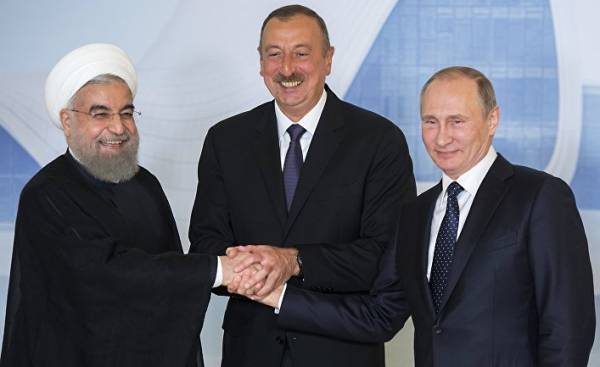 © RIA Novosti, Sergey Guneev | go to fotobanka of Russian President Vladimir Putin to Azerbaijan
© RIA Novosti, Sergey Guneev | go to fotobanka of Russian President Vladimir Putin to Azerbaijan
When trump came to power in Iran’s expert community there were concerns about the fact that the arrival of the person from whom nobody expected victory, may affect the resumption of dialogue between the US and Russia and rapprochement of these countries. Tehran feared that Moscow will begin in Syria to communicate with Washington, and Iran’s interests will be discarded. While this scenario is not coming true. If now the chances that such a change did take place?
I think such concerns in Iran even stronger and calling them entirely unfounded, is impossible. Although the positions of Russia and the USA on the Syrian issue in recent months and really get involved, but this possibility is potentially saved. In addition, Russia may converge in certain aspects with Turkey, and this makes possible the emergence in Syria of friction between Moscow and Ankara on the one hand, and Iran on the other.
Such fears, but against Iran, are on the Russian side. For Russia and its citizens, Iran still remains largely a “black box”, the misunderstood and the unknown. And the reason lies primarily in the fact that our cooperation has developed in recent years around Syria, is purely opportunistic and spontaneous. It arose not because of, but in spite of. The military-political situation developed in such a way that we have been allies in the face of common threats and challenges in Syria. We had a convergence of interests and build understanding at the level of top management, but we still lack a Foundation of relationship and trust at the institutional level. Hence a large number of fears and concerns.
Recognizing the obstacles that are preventing some kind of renewal of relations between Russia and the United States, we can say that the current situation at least on the Syrian track will remain at least in the medium term. Today, despite claims on the benevolent attitude of the US to the negotiation process in Astana, in Russia there is no confidence that Washington, Moscow will be able to agree on a wide range of issues to their advantage. What can be said about Tehran, in respect of which there are more optimistic expectations.
The victory of Hassan Rouhani in the presidential election added some weight to the group of Russian elites who are advocating the development of pragmatic cooperation with Tehran. Hasan Rouhani looks like a fairly reliable, predictable (in a good sense), a clear counterpart with whom to do business is possible with mutual benefit for both parties. But we cannot ignore the fact that in the United States can offer Russia far more than Iran in a much broader range of areas. Therefore, Iran is if he is also interested in developing cooperation with the Russian Federation, it is necessary to conduct a flexible policy and to take into account the interests of Russia not only in regional but also global context. Understanding and mutual respect of each other’s interests is the guarantee of prosperity of the Russian-Iranian partnership not only in Syria but also in Eurasia as a whole.
The more Russia is involved in the Affairs of the Middle East, the more it is growing awareness of the need to build long-term relationships with countries in the region.
Iran in this respect, one of the first partners for Russia. He moves towards further integration in the SCO. Discusses broader cooperation with the Eurasian economic Union. Thus, gradually increasing the number of areas for deepening cooperation between the two countries.
However, it is very difficult, but is necessary to overcome the burden of historical past which divides us. In this respect, Iran harder than Russia. Russian society today has forgotten all that history and those moments when Russia is against Iran acted as the aggressor and occupier. But it is the image of Russia is preserved in the historical memory of a significant part of Iranian society. The Iranian nation remembers the events of the 1920s and 1940-ies, when the policy of the Bolsheviks and the Soviet government threatened the territorial integrity of his country. In this regard, an urgent task for the Russian and Iranian politicians and scientists is not to postpone in the past these issues and try to resolve and overcome these long-standing differences and open a new page in the history of bilateral cooperation. This economy, and cross-border cooperation, culture, and tourism. All this will create a load of those favourable weight, which will not “go away” as fast as “agreed”. Thus on the Syrian track, we can convert a temporary Alliance in longer. But it also has its own danger — we see differently the future of Syria, as well as the degree of participation of each of us in the future.
And can the United States and, in particular, trump push Russia and Iran towards a rapprochement?
— He can do it, doing the things that both in Moscow and in Tehran will be seen as a direct threat to their interests.
Like hitting the “Tomahawks” in Syria can be attributed to such actions?
— Yes, but not only that. Distancing the United States from participation in any regional issues and problems, too, go here for good. Russian-Iranian rapprochement is largely due to the General understanding of the principles, on which to build the security architecture and world order in the middle East and North Africa.
We stand for the equality of constituent entities that are in the region, and reducing the role of external forces in the internal Affairs of the countries of the region. This position is significantly different from the principles on which US middle East policies. This difference of approaches can be a good basis for building a relationship not only between Russia and Iran, but other countries, including Turkey. Between the three countries a lot of contradictions, but the beginning of the era of pragmatism in the middle East objectively contributes to their convergence.
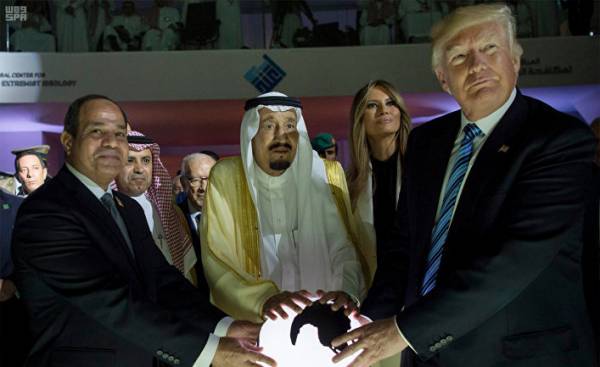 © AP Photo, Saudi Press Agency via Apresident of Egypt Abdel Fattah al-Sisi, king of Saudi Arabia, US first lady Melania trump and Donald trump
© AP Photo, Saudi Press Agency via Apresident of Egypt Abdel Fattah al-Sisi, king of Saudi Arabia, US first lady Melania trump and Donald trump
When an idealistic utopia go by the wayside, and at first there is the problem of pragmatic solutions to existing problems can be the most unexpected alliances. We have seen how suddenly approached Russia and Iran, which before the Syrian crisis were not allies. Now we are seeing them improve relations with Turkey, a NATO member and for many years considered a conduit of US interests in the middle East. In addition, there is a cautious rapprochement between Iran and Qatar, which until recently was the main sponsor of all the enemies of Iran and Russia in the region. It is not excluded that in a year will be even more unpredictable and alliances.
In this respect, the actions of the US under the current administration may push countries in the region to abandon habitual patterns of behavior and the transition to the new format of relations on the basis of pragmatism, mutual respect for each other’s sovereignty and national interests. It may open a new era for the Middle East.
How has the position of Saudi Arabia in the middle East after the arrival of trump?
— Saudi Arabia under Barack Obama was, in fact, aside from the politics of Washington, and its relations with the US have not evolved. Today, in the face of the trump she’s got the power that will provide moral support, and will not interfere in the way of Riyadh provides its regional interests.
And unless Obama intervened in the politics of Saudi Arabia?
— A deal with Iran, he thereby acted against the strategic interests of Saudi Arabia. He didn’t say that declaring war on Riyadh, but his actions went against the interests of the Saudis.
Today benevolent neutrality on the part of the US is Saudi Arabia good. The time is coming new leaders. The new heir to the throne in Saudi Arabia wants to make a breakthrough in the development of the country. For this he in the medium term it is necessary not only to implement the program 2030, which is aimed at restructuring the country’s economy, but also to change the nature of relations in the middle East. First of all it concerns the inner circle of Saudi Arabia monarchies of the Arabian Peninsula. It was impossible to imagine that the conflict between Saudi Arabia and the UAE on the one hand, and Qatar on the other, will reach a state that we observed in June 2017, if not benevolent neutrality from the United States.
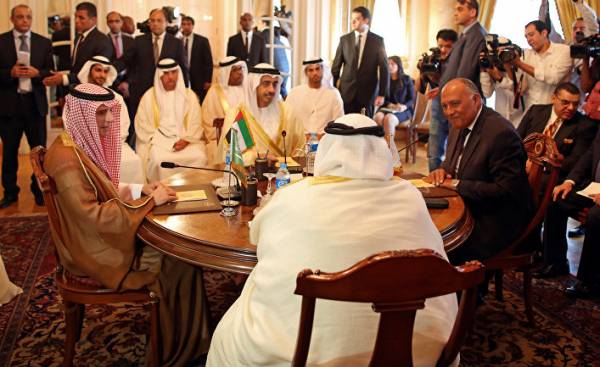 © AP Photo, Khaled ElfiqiЗаседание of the foreign Ministers of Saudi Arabia, UAE, Bahrain and Egypt in Cairo. 5 Jul 2017
© AP Photo, Khaled ElfiqiЗаседание of the foreign Ministers of Saudi Arabia, UAE, Bahrain and Egypt in Cairo. 5 Jul 2017
After a visit to trump in Saudi Arabia, Riyadh has received carte Blanche to represent the American interests in the region. The Kingdom is going to sculpt the region as it is necessary, given the interests of the United States. It begins, of course, from the Arabian Peninsula, where there are two key problems. Uncontrollable, but having colossalism resources, Qatar and Yemen conflict to be resolved by any means as soon as possible.
Further the interests of the Saudis will go wider. However, the farther from the Arabian Peninsula, the more Saudi Arabia will need to work with other regional players, and the Saudi elite knows it. You can ignore Iran, but will have to cooperate with Turkey, Egypt and Russia.
In a short time in Russia should come Prime Minister of Iraq, and then probably king Salman. All this largely demonstrates the changed role of Russia, which ready to talk with Qatar, and Saudi Arabia and all other countries in the region. Moscow’s position has been considerably strengthened because US policy looks less predictable and attractive to the major regional actors.
Today both Russia and the Middle East profitable to build a new multipolar order in the region. This idea is also supported by China and partly by the European Union. Until recently the US was not ready for such rapid change. However, they now begin to understand a new reality. The average American voter is also aware and wants to reduce the involvement of their country in “overseas” matters, what is not least evidenced by the coming to power of trump. Therefore, the process is hardly reversible. And trump, as well feeling the situation the man is not against this process, and moves with it. In these circumstances, we can only predict that the region will continue to change. And not the fact that in the worst way.
